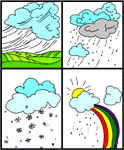|
|
1. What property explains why a pin can float on water?
2. A fresh egg is placed in water and it sinks, another fresh egg is placed in a solution of water and salt and it floats. Which solution is more dense? Why does the egg float? 3. What surface should warm up the fastest?
4. Heat makes molecules move:
5. Why does the wind blow?
6. The following is not a component of the water cycle?
7. Heat will ______________ water.
8. Oceans makes up about what percentage of the world's surface?
9. A cold front:
10. Air masses can be:
11. What is a meteorologist?
12. A dry climate would:
13. Weather is not very stable. It seems to change very rapidly. Can you explain some of the reasons why this happens? ANSWERS: 1.(A); 2. the salt water; salt water is denser and can support the egg; 3.(B); 4.(A); 5.(B); 6.(D); 7.(A); 8.(D); 9.(B); 10.(D); 11.(A); 12.(C); 13. Weather is dependent on the cooling and heating of surfaces, moisture in the air, difference is temperature of land and water. There are so many different temperatures and so many interactions of moisture that it is very difficult to predict. |

 Water
Cycle
Water
Cycle